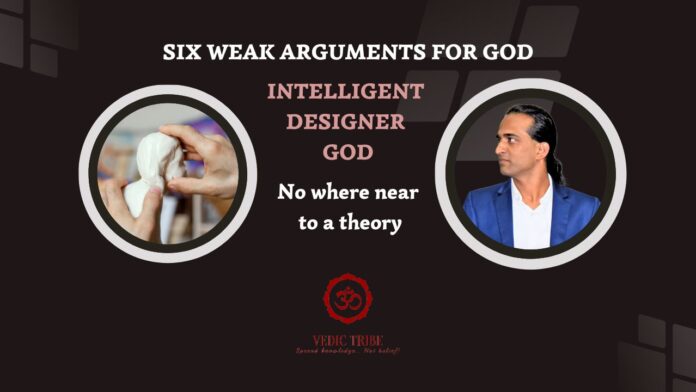God as intelligent designer:
In the previous article, we discussed the second weak argument for God – “God of gaps” and in this article, we will discuss the weak argument – “Intelligent Designer God”.
The “Intelligent Design” argument proposes that the complexity and order observed in the universe, particularly in biological systems, are best explained by the actions of an intelligent designer, often identified as God.
This argument is often presented as an alternative to the theory of evolution by natural selection.
Irreducible Complexity:
Complexity: Proponents argue that certain biological systems are too complex to have evolved gradually through natural selection. They contend that these systems must have been designed as a whole, as the removal of any part would render the system non-functional.
Bacterial flagellum: For instance, the proponents of intelligent design argue that the bacterial flagellum is irreducibly complex because it requires all of its component parts to be present and functioning correctly for it to work. They assert that removing any single part would render the entire system useless, making it impossible for the flagellum to have evolved gradually through natural selection.
Specified Complexity:
Complexity and specificity: This concept, developed by William Dembski, argues that certain features of the universe exhibit both complexity and specificity, characteristics that are unlikely to arise by chance.
Design: For example, a splash of colours on canvas can be an accident even though it looks complex. But a painting like Mona Lisa is both complex and specific. This level of complexity and specificity, according to Dembski, suggests intelligent design.
Why Intelligent Design is Not Considered Scientific:
Lack of Empirical Evidence: The existence of an intelligent designer is not supported by empirical evidence. There is no scientific method to directly observe or test for the actions of an intelligent designer.
Untestable and Unfalsifiable: The core claim of intelligent design is not scientifically testable. If all complex phenomena can be attributed to an intelligent designer, there is no way to disprove the claim. Scientific theories, by their nature, must be falsifiable – there must be potential observations that could disprove them.
Misuse of Scientific Terminology: Intelligent design proponents often use scientific-sounding terms like “irreducible complexity” and “specified complexity,” but these concepts are not always rigorously defined or supported by empirical data.
The Vedic Perspective:
Divine intelligence: In Vedic tradition workings of the cosmos are attributed to three aspects of Brahman:
– Iccha Shakti (The divine “will”)
– Jnana Shakti (The divine “knowledge”)
– Kriya Shakti (The divine “ability”)
Divine within:
Immanence: The divine immanent in cosmos is also resident in the very individual consciousness. The divine knowledge behind the cosmos is also present in the microcosm.
Meditation: There is no need to search for intelligence outside, because with a meditative mind & devotion, we can experience the divine within. We must challenge the common tendency to seek answers, guidance, or meaning in external sources.
Validation vs enlightenment: True spiritual fulfillment is not achieved by seeking external validation or material possessions, but by turning inward and cultivating a connection with the divine that resides within. Through meditation and devotion, one can transcend the limitations of the ego and experience the ultimate reality via subjective enlightenment.
Conclusion:
While the “Intelligent Design” argument presents an interesting challenge to evolutionary theory, it falls short of meeting the criteria of a scientific theory. It relies on untestable claims and often misuses scientific terminology.
Vedanta, while acknowledging the complexity and order of the universe, offers a different approach, emphasizing inner exploration and the subjective experience of consciousness as paths to understanding reality.
In our next article, we will discuss the weak argument for God: “Simulator God”
Madhwesh K
Vedic Tribe

